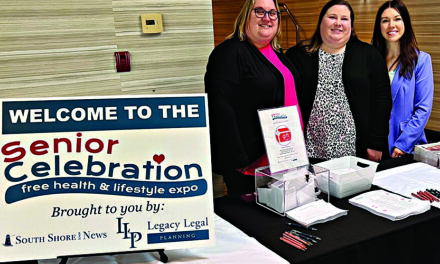By Nicole Long, MSW, LICSW,
CEO of Old Colony Elder Services
Did you know? The number-one cause of injury and injury-related fatality among older adults is unintentional falling. According to the National Council on Aging (NCOA), more than half of all falls happen at home.
Objects such as footstools, floor plants, electrical cords, pillows, bedding, shoes, throw rugs, and other items on the floor are all considered trip hazards and may cause you to fall.
The most common injury from a fall is a fracture. Older adults who have a condition such as osteoporosis are particularly at risk of a fracture from a fall.
Preventing falls
It’s important to know that most falls can be prevented. Making your living area safer is one of the keys to fall prevention. Here are some useful tips:
Keep your hallways and rooms well lit. Replace lightbulbs as soon as possible, and use nightlights in hallways, bathrooms, and bedrooms to provide additional illumination at night.
Use tape or clips to secure electrical cords for lamps, computers, televisions, and other devices to the floors or walls.
Consider bath safety. Have grab bars installed for extra support in the shower, tub, and near the toilet. Utilize a shower seat. Use non-skid bath mats on the floor and avoid wet floors.
Take a good look at each room of your home and eliminate any trip hazards. Put away shoes, books, magazines, pet toys, and other items. Be sure to tuck in bedspreads and other bedding so you don’t trip on the material as you walk by. Remove slippery throw rugs, relocate plants and other items so they are completely out of your walking path. Keep stairways clear.
Staying strong
Exercise is one of the best preventive measures, as it improves balance and increases strength and flexibility. Not sure which type of exercise would be appropriate for you? Talk with your health care provider about starting an exercise program that will help you build strength and improve your balance so you can reduce your risk of falls.
Since vision impairment increases fall risk, be sure to have your vision checked annually and keep your eyeglasses up to date.
Be aware that chronic health conditions such as cardiovascular disease, diabetes, arthritis, dementia, and Parkinson’s, as well as medications that may cause dizziness or drowsiness, are factors that can increase fall risk. Be sure to discuss any concerns with your doctor.
Heed your doctor’s advice to get aids such as a walker or a cane with instruction from a physical therapist. A walking aid can help you get around safely and reduce your risk of falling. It will also help you maintain your mobility and independence.
Take action
According to the CDC, falls are the most common cause of traumatic brain injuries. An older adult who falls and hits their head should see a doctor immediately.
Falls Prevention Awareness Week, the national campaign to raise awareness about preventing falls and reducing fall risk, is September 23-27, 2024. Falls prevention workshops and events can help you learn more about the steps you can take to help ensure that you and your family, friends, and neighbors know how to prevent falls.
Are you or a loved one at risk of falling? The NCOA offers a brief screening survey on its website, www.ncoa.org/tools/falls-free-checkup.
Falls prevention workshops
Looking for a local falls prevention workshop? Check with your senior center or council on aging for falls prevention or exercise programs.
“A Matter of Balance” is an evidence-based program that emphasizes practical strategies to control, manage and avoid falls. Old Colony Elder Services (OCES), the nonprofit agency serving older adults and individuals with disabilities throughout Plymouth County and surrounding towns, offers “A Matter of Balance” workshops through our Healthy Living Program.
For more information about falls prevention or to learn more about A Matter of Balance workshops, visit ocesma.org/events or contact OCES’ Healthy Living Program at 508-584-1561.
Sources:
National Council on Aging (NCOA). www.ncoa.org/article/get-the-facts-on-falls-prevention; www.ncoa.org/older-adults/health/prevention/falls-prevention; and www.ncoa.org/tools/falls-free-checkup.
U.S. Centers for Disease Control and Prevention (CDC): www.cdc.gov/falls/data-research/facts-stats/index.html
About the Author: Nicole Long is the Chief Executive Officer of Old Colony Elder Services (OCES). Founded in 1974, OCES is a private, non-profit organization proudly serving greater Plymouth County and surrounding communities. OCES is designated as one of 25 Aging Services Access Points (ASAPs) in the Commonwealth of Massachusetts. OCES’s mission is to support the independence and dignity of older adults and individuals with disabilities by providing essential information and services that promote healthy and safe living. The agency offers a number of programs to serve older adults, individuals with disabilities, their families and caregivers. For more information call 508-584-1561 or visit www.ocesma.org.




